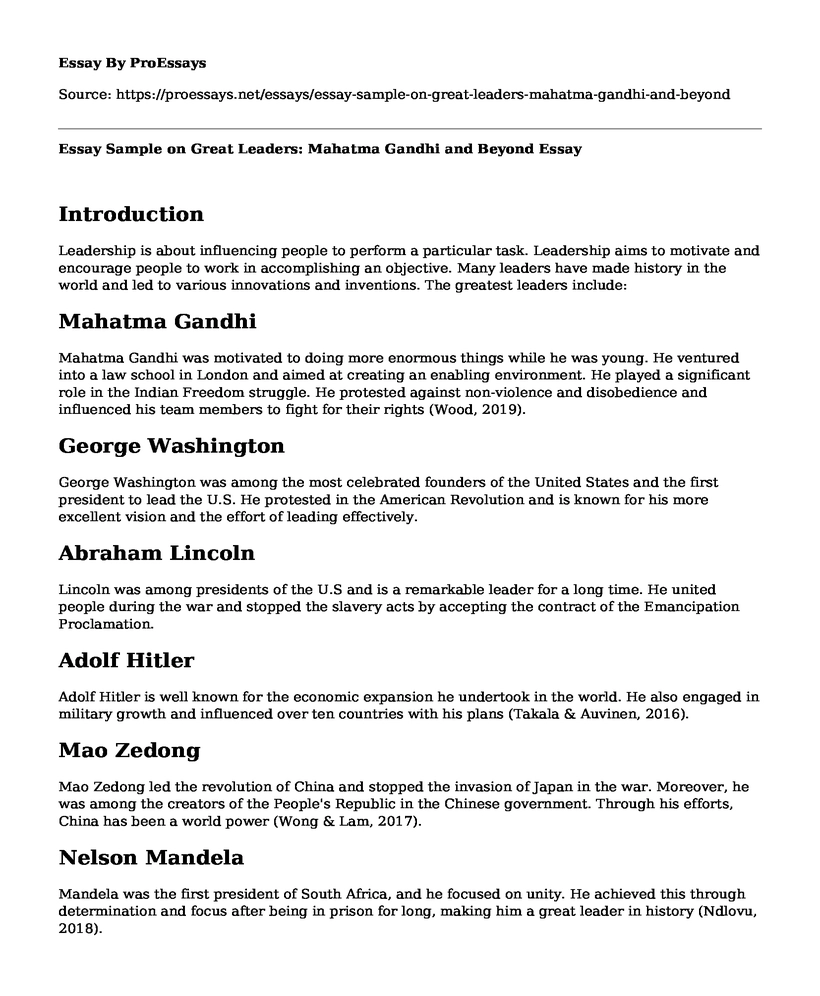Introduction
Leadership is about influencing people to perform a particular task. Leadership aims to motivate and encourage people to work in accomplishing an objective. Many leaders have made history in the world and led to various innovations and inventions. The greatest leaders include:
Mahatma Gandhi
Mahatma Gandhi was motivated to doing more enormous things while he was young. He ventured into a law school in London and aimed at creating an enabling environment. He played a significant role in the Indian Freedom struggle. He protested against non-violence and disobedience and influenced his team members to fight for their rights (Wood, 2019).
George Washington
George Washington was among the most celebrated founders of the United States and the first president to lead the U.S. He protested in the American Revolution and is known for his more excellent vision and the effort of leading effectively.
Abraham Lincoln
Lincoln was among presidents of the U.S and is a remarkable leader for a long time. He united people during the war and stopped the slavery acts by accepting the contract of the Emancipation Proclamation.
Adolf Hitler
Adolf Hitler is well known for the economic expansion he undertook in the world. He also engaged in military growth and influenced over ten countries with his plans (Takala & Auvinen, 2016).
Mao Zedong
Mao Zedong led the revolution of China and stopped the invasion of Japan in the war. Moreover, he was among the creators of the People's Republic in the Chinese government. Through his efforts, China has been a world power (Wong & Lam, 2017).
Nelson Mandela
Mandela was the first president of South Africa, and he focused on unity. He achieved this through determination and focus after being in prison for long, making him a great leader in history (Ndlovu, 2018).
Julius Caesar
Julius was a military leader and a politician who conducted various campaigns with success. He created the Roman government and was motivated to building a vast empire.
Fidel Castro
Fidel influenced the Cuban amendment and was the president of Cuba. He has been a remarkable leader through having a more comprehensive vision for Cuba. He is fond of hiring the right individuals and having courage making him a great leader in history.
References
Ndlovu-Gatsheni, S. J. (2018). Nelson Mandela and the Decolonial Paradigm of Peace. In The Routledge History of World Peace since 1750 (pp. 154-164). Routledge. Retrieved from https://www.taylorfrancis.com/books/e/9781315157344/chapters/10.4324/9781315157344-12
Takala, T., & Auvinen, T. (2016). The power of leadership storytelling: Case of Adolf Hitler. Tamara: Journal for Critical Organization Inquiry, 14. Retrieved from https://jyx.jyu.fi/handle/123456789/49268
Wong, Y. C. & Lam, W. W. L. (2017). The legacy of Mao Zedong. In Routledge Handbook of the Chinese Communist Party (pp. 31-46). Routledge. Retrieved from https://www.taylorfrancis.com/books/e/9781315543918/chapters/10.4324/9781315543918-2
Wood, H. G. (2019). Reflections on Mr. Gandhi's Leadership. In Mahatma Gandhi (pp. 318-323). Routledge. Retrieved from https://www.taylorfrancis.com/books/e/9780429059162/chapters/10.4324/9780429059162-57
Cite this page
Essay Sample on Great Leaders: Mahatma Gandhi and Beyond. (2023, Apr 04). Retrieved from https://proessays.net/essays/essay-sample-on-great-leaders-mahatma-gandhi-and-beyond
If you are the original author of this essay and no longer wish to have it published on the ProEssays website, please click below to request its removal:
- TV Show Review: Into the Badlands - Leadership
- Assignment Example on Leadership and Management
- The Cold War and Decolonization Essay
- Critiquing Colonization of Nature: Buying from Killjoy's "Wardens"
- Suburbanization and Pursuit of Happiness Essay
- Essay Example on Data Center Facility Risks: Power, Fire & More
- Essay Sample on Project Scheduling: Automated Alerts for Efficiency and Success







